|
|
|
Sort Order |
|
|
|
Items / Page
|
|
|
|
|
|
|
| Srl | Item |
| 1 |
ID:
145105
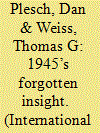

|
|
|
|
|
| Summary/Abstract |
The 70th anniversary of the signing and entry into force of the UN Charter provided an occasion to explore the historical underpinnings of contemporary global governance. This article redresses the neglect of the United Nations as a multilateral structure before the conference that drafted the Charter in 1945. It rehabilitates an underappreciated aspect of the period that began on January 1, 1942, with the “Declaration by United Nations,” namely, the combination of multilateral strategies for military and human security to achieve victory in war and peace. The wide substantive and geographic resonance suggests the extent to which the pressures of the second war to end all wars helped states to overcome their disinclination to collaborate. Today’s fashionable calls for “good enough” global governance abandon the strategy of constructing robust intergovernmental organizations; they are not good enough, especially, because our forebears did much better. Many insights and operational approaches from 1942 to 1945 remain valid for addressing twenty-first-century global challenges.
|
|
|
|
|
|
|
|
|
|
|
|
|
|
|
|
| 2 |
ID:
108003
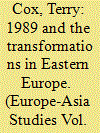

|
|
|
| 3 |
ID:
100190
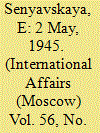

|
|
|
|
|
| Publication |
2010.
|
| Summary/Abstract |
THE PSYCHOLOGY OF THE WINNER in the Great Patriotic War is a unique phenomenon. It is the psychology of those people who lived through its initial period with its crushing defeats and retreats and the no less difficult subsequent stages with their unprecedented large-scale battles, when it was still not totally clear who would be the winner. But now there was no longer any doubt: our Victory was close at hand. And the feeling of being a winner, on the eve, during, and immediately after the Victory, indeed created a special psychological state in the people who had endured all the trials and tribulations and destroyed a strong, ruthless and lethal enemy.
It stands to reason that the entire war was a test of the spiritual and moral fiber of the Soviet soldier in conditions of constant risk, in situations that required immense exertion of every human strength, and often also self-sacrifice. Each period of the Great Patriotic War, with its particular moral and psychological dominant, determined the changes in the spiritual makeup of the frontline soldiers and in an individual's attitude to different areas of reality and life's values. But the feeling that Victory was near was particularly inherent in the final stage of the war, which in itself aroused an entire set of thoughts and feelings and a complex psychological state.
|
|
|
|
|
|
|
|
|
|
|
|
|
|
|
|
| 4 |
ID:
138438


|
|
|
|
|
| Summary/Abstract |
As Army chief of staff, secretary of state, and secretary of defense, George C. Marshall played a major role in creating, implementing, and defending the multilateral “Europe-First” global strategy that guided U.S. foreign and military policies through World War II and the Cold War. This lecture explores how and why he did so, emphasizing the decision to defeat Germany before Japan, the postwar European Recovery Program that bears Marshall’s name, and the relief of General Douglas MacArthur during the Korean War for his refusal to accept this grand strategy. In the process it analyzes the complex relationship that exists between diplomatic and military history.
|
|
|
|
|
|
|
|
|
|
|
|
|
|
|
|
| 5 |
ID:
154876
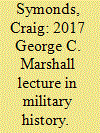

|
|
|
|
|
| Summary/Abstract |
Of all the various ways that American participation in World War II contributed to Allied victory, the most critical, and in the end the most decisive, was American industrial productivity, and particularly shipbuilding. United States ship construction between 1941 and 1945 dramatically outstripped both its own allies and all of its foes combined. The United States was not only the “arsenal of democracy” (Franklin Roosevelt’s phrase) but also the Allies’ shipbuilder, and superiority in shipping is what allowed the Allies to win the Battle of the Atlantic, conduct the D-Day invasion, and mount a simultaneous offensive in the Pacific.
|
|
|
|
|
|
|
|
|
|
|
|
|
|
|
|
| 6 |
ID:
125113
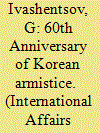

|
|
|
|
|
| Publication |
2013.
|
| Summary/Abstract |
ON JULY 27, 2013, it will be 60 years since the Armistice Agreement was signed in the village of Panmunjom, putting an end to the three-year Korean War. That war, which has become the bloodiest and most devastating military conflict since the end of World War II, remains an unhealed wound for the Koreans while its consequences are still making an impact on the international situation in Northeast Asia and beyond.
|
|
|
|
|
|
|
|
|
|
|
|
|
|
|
|
| 7 |
ID:
173284
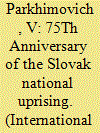

|
|
|
|
|
| Summary/Abstract |
ON AUGUST 29, 2019, Slovakia celebrated the 75th anniversary of the start of one of the most powerful European anti-Nazi insurrections of World War II, the Slovak National Uprising (Slovenské narodné povstanie), which lasted from August 29 to October 28, 1944. August 29, Slovak National Uprising Anniversary, is one of the country's main national holidays. It is marked with events and ceremonies such as commemorative rallies and the laying of flowers at memorials in Bratislava, Banska Bystrica, and other parts of Slovakia.
|
|
|
|
|
|
|
|
|
|
|
|
|
|
|
|
| 8 |
ID:
107317


|
|
|
|
|
| Publication |
2011.
|
| Summary/Abstract |
The 8th Conference of the Russian-Chinese Friendship Society to hear reports and elect officials was held at the Federation for Peace and Conciliation in Moscow on December 6, 2010. This Society is the legal successor of the Society of Soviet-Chinese Friendship set up in the U.S.S.R on October 29, 1957.
|
|
|
|
|
|
|
|
|
|
|
|
|
|
|
|
| 9 |
ID:
047517
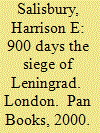

|
|
|
|
|
| Publication |
London, Pan Books, 2000.
|
| Description |
xv, 635p.Pbk
|
| Series |
Pan Grand Strategy Series
|
| Standard Number |
0330392824
|
|
|
|
|
|
|
|
|
|
|
|
Copies: C:1/I:0,R:0,Q:0
Circulation
| Accession# | Call# | Current Location | Status | Policy | Location |
| 043488 | 940.54/SAL 043488 | Main | On Shelf | General | |
|
|
|
|
| 10 |
ID:
106617
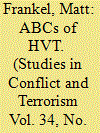

|
|
|
|
|
| Publication |
2011.
|
| Summary/Abstract |
The use of high value targeting (HVT)-using military and police forces to kill or capture leaders of insurgent and terrorist groups-has increased exponentially since the terrorist attacks of September 11, 2001. HVT operations have become the primary tool of the United States for combating Al Qaeda and its affiliates worldwide, and while these operations have eliminated scores of terrorists and insurgents from the battlefield, they haven't always led to strategic success. Utilizing a data set of 20 distinct HVT campaigns dating back to the end of World War II, this article will highlight the positive and negative effects of HVT efforts throughout history and identify six key lessons from past campaigns and their implications for the United States. The body of the paper looks at the important issues inherent to any HVT campaign, including the benefits of having a local force carry out the campaign, the importance of incorporating HVT into a larger counterinsurgency strategy, and the necessity of understanding the dynamics of the group being targeted. The United States has historically struggled in all of these areas, leading to difficulties in achieving success through HVT operations, but these historical lessons also provide opportunities for progress. The article concludes with important implications for the United States and identifies strategies for improvement in these pivotal areas, including expanding relationships with host governments, leveraging new technologies, and contemplating unique ways to approach target sets. Failure to make these changes, the article argues, will leave the United States with the same strategic failures it had with the infamous "deck of cards" in Iraq, where the focus on HVT at the expense of counterinsurgency both helped create and failed to stop the spread of a nationwide insurgency.
|
|
|
|
|
|
|
|
|
|
|
|
|
|
|
|
| 11 |
ID:
130619
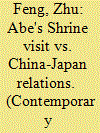

|
|
|
| 12 |
ID:
042244
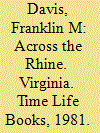

|
|
|
|
|
| Publication |
Virginia, Time Life Books, 1981.
|
| Description |
208p.Hbk
|
| Contents |
Vol. XXII: World War II
|
| Standard Number |
0809425432
|
|
|
|
|
|
|
|
|
|
|
|
Copies: C:1/I:0,R:0,Q:0
Circulation
| Accession# | Call# | Current Location | Status | Policy | Location |
| 019487 | 940.5421/DAV 019487 | Main | On Shelf | General | |
|
|
|
|
| 13 |
ID:
122547
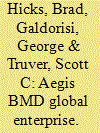

|
|
|
|
|
| Publication |
2012.
|
| Summary/Abstract |
For more than three decades, beginning soon after the end of World War II, the
United States and the Soviet Union faced off against each other. The concept
of "mutual assured destruction"-MAD, the U.S. threat of massive retaliation
to a Soviet first strike-became America's Cold War de facto strategic defense
policy. In March 1983, however, President Ronald Reagan asked whether ballistic
missiles could be destroyed before they reached the United States or its allies,
thus catalyzing efforts for a national ballistic-missile-defense program that would
undermine the need for MAD. That same year, the U.S. N avy commissioned USS
Ticonderoga (CG 47), the first of what is to become a fleet of more than eighty
Aegis warships. In 2012, these trends have converged, and Aegis ballistic-missile
defense (BMD) is an increasingly important component of a robust national
BMD System (BMDS).
|
|
|
|
|
|
|
|
|
|
|
|
|
|
|
|
| 14 |
ID:
183675
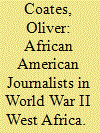

|
|
|
|
|
| Summary/Abstract |
The National Negro Publishers Association (NNPA) Commission to West Africa in 1944–1945 represents a major episode in the history of World War II Africa, as well as in American–West Africa relations. Three African American reporters toured the Gold Coast, Sierra Leone, Nigeria, Liberia, and the Congo between November 1944 and February 1945, before returning to Washington, DC to report to President Roosevelt. They documented their tour in the pages of the Baltimore Afro-American, the Chicago Defender, and the Norfolk Journal and Guide. Their Americans’ visit had a significant impact in wartime West Africa and was widely documented in the African press. This article examines the NNPA tour geographically, before analyzing American reporters’ interactions with West Africans, and assessing African responses to the tour. Drawing on both African American and West African newspapers, it situates the NNPA tour within the history of World War II West Africa, and in terms of African print culture. It argues that the NNPA tour became the focus of West African hopes for future political, economic, and intellectual relations with African Americans, while revealing how the NNPA reporters engaged African audiences during their tour.
|
|
|
|
|
|
|
|
|
|
|
|
|
|
|
|
| 15 |
ID:
089942
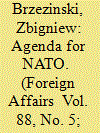

|
|
|
|
|
| Publication |
2009.
|
| Summary/Abstract |
In assessing NATO's evolving role, one has to take into account the historical fact that in the course of its 60 years the alliance has institutionalized three truly monumental transformations in world affairs: first, the end of the centuries-long "civil war" within the West for transoceanic and European supremacy; second, the United States' post-World War II commitment to the defense of Europe against Soviet domination (resulting from either a political upheaval or even World War III); and third, the peaceful termination of the Cold War, which ended the geopolitical division of Europe and created the preconditions for a larger democratic European Union.
|
|
|
|
|
|
|
|
|
|
|
|
|
|
|
|
| 16 |
ID:
037072
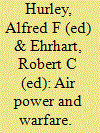

|
|
|
|
|
| Publication |
Washington, United States Air force academy, 1979.
|
| Description |
xii, 461p.
|
|
|
|
|
|
|
|
|
|
|
|
Copies: C:1/I:0,R:0,Q:0
Circulation
| Accession# | Call# | Current Location | Status | Policy | Location |
| 018989 | 358.4009/HUR 018989 | Main | On Shelf | General | |
|
|
|
|
| 17 |
ID:
047172
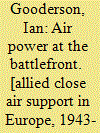

|
|
|
|
|
| Publication |
Londan, Frank Cass, 1998.
|
| Description |
xviii, 282p.Hbk
|
| Series |
Cass Series - Studies in Air Power
|
| Standard Number |
0714646806
|
|
|
|
|
|
|
|
|
|
|
|
Copies: C:1/I:0,R:0,Q:0
Circulation
| Accession# | Call# | Current Location | Status | Policy | Location |
| 044682 | 940.544/GOO 044682 | Main | On Shelf | General | |
|
|
|
|
| 18 |
ID:
051066
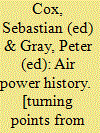

|
|
|
|
|
| Publication |
London, Frank Cass, 2002.
|
| Description |
xix, 362p.
|
| Series |
Studies in air power
|
| Standard Number |
0714682578
|
|
|
|
|
|
|
|
|
|
|
|
Copies: C:1/I:0,R:0,Q:0
Circulation
| Accession# | Call# | Current Location | Status | Policy | Location |
| 048001 | 358.4009/COX 048001 | Main | On Shelf | General | |
|
|
|
|
| 19 |
ID:
051067
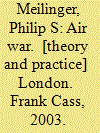

|
|
|
|
|
| Publication |
London, Frank Cass, 2003.
|
| Description |
x, 234p.
|
| Series |
Cass series: studies in air power
|
| Standard Number |
0714682667
|
|
|
|
|
|
|
|
|
|
|
|
Copies: C:1/I:0,R:0,Q:0
Circulation
| Accession# | Call# | Current Location | Status | Policy | Location |
| 048002 | 358.4/MEI 048002 | Main | On Shelf | General | |
|
|
|
|
| 20 |
ID:
042253
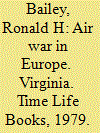

|
|
|
|
|
| Publication |
Virginia, Time Life Books, 1979.
|
| Description |
208p.Hbk
|
| Contents |
Vol. XVI: World War II
|
| Standard Number |
0809424967
|
|
|
|
|
|
|
|
|
|
|
|
Copies: C:1/I:0,R:0,Q:0
Circulation
| Accession# | Call# | Current Location | Status | Policy | Location |
| 019281 | 940.5421/BAI 019281 | Main | On Shelf | General | |
|
|
|
|
|
|
|
|
|